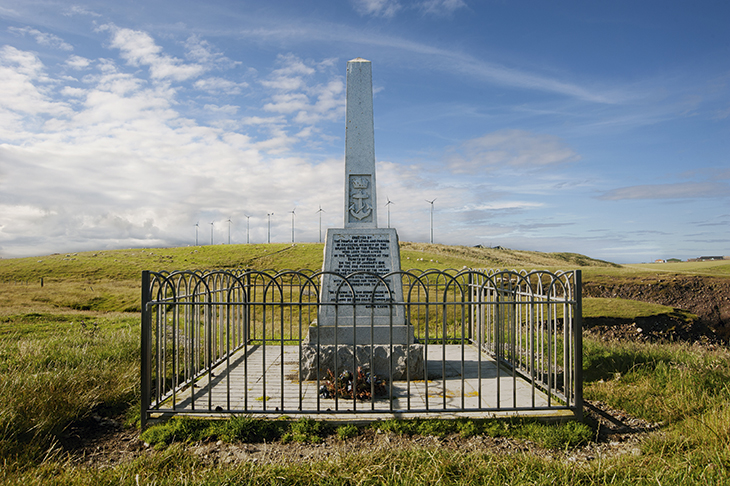The centenaries of the Great War came to a close in November with commemorations of the 1918 Armistice. But one final British centenary associated with that conflict has just passed. Few people on the mainland will be aware of it, though it has certainly been marked in the Outer Hebrides. It is the commemoration of the worst peacetime naval disaster since the sinking of the Titanic. And one of the most terrible, poignant and final tragedies to have come from the Great War.
On the evening of 31 December 1918, a vessel was boarding passengers at the Kyle of Lochalsh. His Majesty’s Yacht Iolaire had been requisitioned by the Admiralty to transport some of the hundreds of Royal Naval Reservists heading back to the Isle of Lewis and Harris after four years of service. There were too many people at Kyle for this boat, and some of the people who marched onboard the steam yacht could not get a seat. But it was New Year’s Eve, the war was over, and the men were returning home.
Though it set off for Stornoway, the Iolaire never made it to harbour. In the early hours of New Year’s Day, the yacht arrived within sight of the lights of Stornoway, where the servicemen’s families and friends were waiting on the quay. But sometime around 2 a.m. the yacht took a wrong course and struck an infamous reef of rocks known locally as the Beasts of Holm. Of the 284 men reckoned to have boarded the Iolaire at Kyle, only 80 made it to land. Just seven of the ship’s 23-strong crew escaped. All four officers were drowned. Among the endless cruel ironies of that night was that the Iolaire was packed with island men who could have guided the vessel to Stornoway harbour with ease.
As John MacLeod recounts in his forensically detailed 2009 book When I Heard the Bell: the Loss of the Iolaire, the yacht hit the rocks at full speed. Though only around 30 yards from shore, the night was pitch black and the January seas were roaring. The vessel immediately tilted, hurling men straight into the icy waters. An effort to lower a lifeboat was thwarted when it was promptly smashed to splinters by the waves. Those men fighting to get off the sides of the vessel were the lucky ones. Inside the ship were scores of their friends, relatives and neighbours who could not get out. As the starboard side went down and the floors turned into walls, few men inside had any chance of escape.
From on deck, one especially brave soul — John Finlay MacLeod — managed to swim and then scramble ashore with a rope. Though this was to be the wreck’s only lifeline, it was a cruel one. As the number of men on shore grew, they used their remaining strength to hold the rope and try to keep it tight for the others to cross. But listing and rolling on the other end was the Iolaire, pulling and then slackening on the rope. And as their eyes adjusted to the dark, those on board could see what might wait for anyone who tried to use it. John MacLean from Carloway saw the first man on the rope — a young seaman — immediately thrashed on the rocks. ‘It would take some nerve for you to get ashore after that,’ he said. Donald Murray later recalled more than a dozen men struggling along the rope ahead of him. ‘You cannot comprehend the ferocity of that sea,’ he remembered. ‘The returning waves were sweeping the rope bare.’ After one wave swept everyone else from the rope, Murray scrambled onto the boulders before the next big wave could overwhelm him. Then the vessel itself gave up. As it titled over to port and disappeared from view, flames shot up from the engine room. With a flash and a bang she went down ‘like a stone’ with scores of men inside her.
And yet she still had passengers. Three men had managed to find their way to the ship’s rigging. Donald Morrison clung to the main mast, while the other two men held onto the foremast. All about them were the shouts of drowning men. Death, as Morrison recalled years later, was in every wave. He clung on as wave after wave came crashing down around and on top of him. The other two men who were clinging on with him were swept away. Soon he was the only one left.
He later described how, just as he thought he could hold on no longer, some lines from Psalm 37 came into his head in Gaelic (‘Thig treis is furtachd thuc’ o Dhia,/ le fuasgladh an deagh àm’). ‘The Lord shall help, and them deliver, / he shall them free and save.’ He held on all night. Word had by this point reached Stornoway and so at around ten in the morning, in the first light of the new year, a motor launch with a volunteer crew managed, at great risk, to ease the Iolaire’s last remaining passenger off the vessel. Of all the men who had boarded the Iolaire at the Kyle of Lochalsh, Morrison was, as he put it himself, ‘the only one to step ashore on Stornoway pier’.
With daylight, the full scale of the disaster became clear. So many bodies were washing up on the rocks that even as they were laid out first on the grass and then in the mortuaries in Stornoway, it became apparent that there were not enough coffins on the island for all of the dead.
Among those few who made it to shore, some staggered the last miles home to their villages. Yet there was no respite there, for the relatives of other passengers of the Iolaire swiftly surrounded them, desperate for news of their husbands, fathers and sons. These small communities of an island that had already given a thousand of their men to the war now learned how many of those who had survived had drowned on their own doorstep.
The official inquiry that followed did not satisfy the island. But nothing could have done. The Iolaire’s officers had clearly been at fault. Rumours persisted that they must have been drunk. There was guilt too: guilt that more had not been able to be done in time from shore, and of course there was survivor’s guilt. But with no one to direct ill feeling at, and in the midst of a tragedy of such irreconcilable cruelty, the island largely shuttered down on its grief. The last man to have survived the Iolaire died in 1992. The last of the sweethearts of one of the drowned men died in 2006. The last of the children orphaned by the vessel passed away over the course of this decade.
Even today the Iolaire is mentioned on Lewis and Harris in a tone of grief and shock. So deep was the wound that it took until after the next war for a memorial to be erected on the cliffs above the Beasts of Holm. The words of the psalm chosen for the memorial sum up, in Gaelic, the incomprehension and faith which was the island’s deep response to the blow that had struck it: ‘Thy way is in the sea, and thy path in the great waters, and thy footsteps are not known.’
Got something to add? Join the discussion and comment below.
Get 10 issues for just $10
Subscribe to The Spectator Australia today for the next 10 magazine issues, plus full online access, for just $10.
You might disagree with half of it, but you’ll enjoy reading all of it. Try your first month for free, then just $2 a week for the remainder of your first year.















Comments
Don't miss out
Join the conversation with other Spectator Australia readers. Subscribe to leave a comment.
SUBSCRIBEAlready a subscriber? Log in